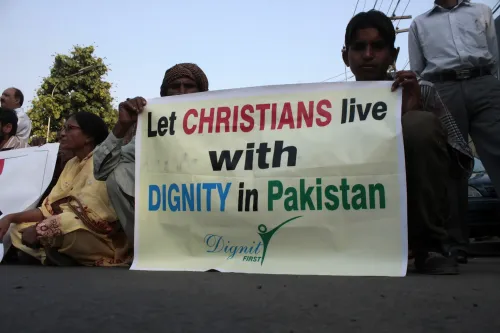Bangladesh Faces Air Quality Crisis as Temperatures Dwindle

Dhaka, Dec 12 (NationPress) As temperatures have dropped significantly in the past few weeks across Bangladesh, the air quality in the capital city of Dhaka has deteriorated drastically, resulting in considerable distress for millions of megacity inhabitants.
For a long time, Dhaka has struggled with issues related to air pollution, ranking third globally for the worst air quality, with an air quality index (AQI) reading of 206 at 9 a.m. local time on Thursday. Earlier this week, on Tuesday, Dhaka recorded an AQI of 241 at 9:00 a.m., placing it first among the cities with the most polluted air, as reported by Xinhua news agency.
An AQI score ranging from 151 to 200 is classified as “unhealthy”, while scores of 201-300 are deemed “very unhealthy”, and those between 301-400 are considered “hazardous”, posing serious health threats to the community.
Indicating that air quality in Dhaka and adjacent areas has declined to unhealthy and at times hazardous levels (AQI exceeding 250), the interim government of Bangladesh urged the public on Tuesday to wear masks when outside, recommending that sensitive individuals limit outdoor activities unless absolutely necessary.
Asadullah Al Ghalib, a lawyer from the Bangladesh Environmental Lawyers Association (BELA), informed Xinhua that the primary contributors to pollution in Dhaka include construction activities, vehicle emissions, and household pollution during the winter months.
Experts indicate that pollution levels in Dhaka are consistently rising as temperatures continue to fall, compounded by meteorological factors such as a decrease in wind speed and the onset of haze. The dry northwesterly winds have begun to blow in, which is expected to further lower temperatures, exacerbating the air pollution crisis.
The World Health Organization (WHO) estimates that air pollution is responsible for around seven million deaths globally each year, primarily due to increased fatalities from stroke, heart disease, chronic obstructive pulmonary disease, lung cancer, and acute respiratory infections.
Mohammad Mushtuq Husain, former adviser to the Institute of Epidemiology, Disease Control and Research under Bangladesh's Ministry of Health and Family Affairs, noted that the health risks for day laborers exposed to high levels of PM2.5 escalate significantly, particularly those who work outdoors. He emphasized that inhaling such toxic air can lead to numerous health issues, including respiratory infections, heart disease, stroke, and lung cancer.
He underscored the importance of implementing immediate, medium-term, and long-term strategies to safeguard the population from the harmful effects of airborne diseases, which lead to a surge of patients suffering from respiratory problems at hospitals during this season.
Syeda Rizwana Hasan, adviser to the Ministry of Environment, Forest, and Climate Change, recently stated that the government has established the National Air Quality Management Action Plan to strategically address the sources of air pollution, enhance air monitoring, and improve enforcement measures.
This plan serves as a roadmap for instituting stringent regulations and advocating for cleaner technologies in industries, transportation, and urban development.
The Environment Adviser affirmed that the action plan is part of Bangladesh's more extensive strategy to achieve sustainable environmental goals, focusing on mitigating the alarming levels of pollution that impact both rural and urban regions.










